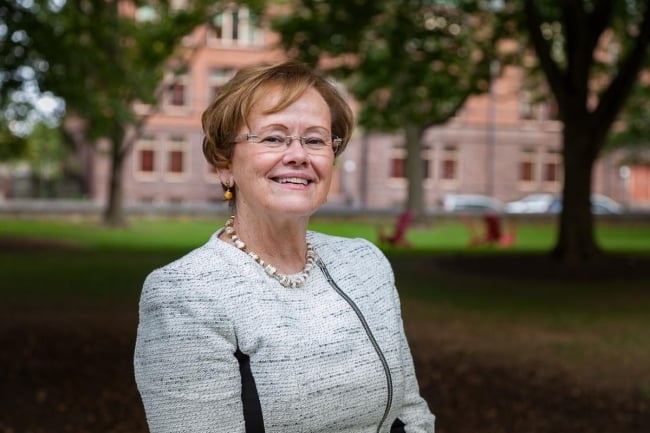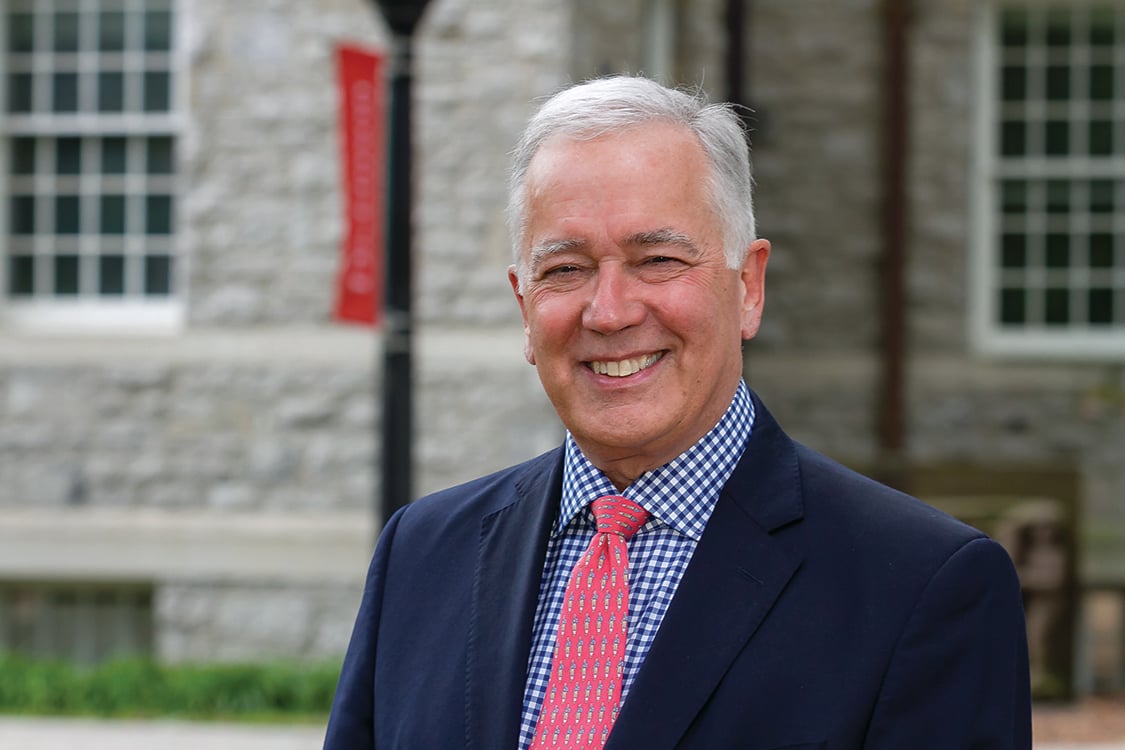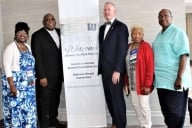You have /5 articles left.
Sign up for a free account or log in.

Margee M. Ensign is resigning as president of Dickinson College so that she can return to the institution she led before Dickinson.
Courtesy of Dickinson College
Dickinson College announced a presidential transition Friday that’s unusual -- for multiple reasons.
The college’s president, Margee M. Ensign, is resigning effective June 30 so that she can return to the institution she led before Dickinson, American University of Nigeria. She will be replaced on an interim basis for two years by the college’s current board chair, John E. Jones III, who is retiring as chief judge for the U.S. Middle District of Pennsylvania.
That means Dickinson, a 2,200-student private liberal arts college in Carlisle, Pa., has a departing president leaving for her previous job. It also means it has a board chair who will take her place and who will become a nontraditional college president -- one who didn’t rise through the ranks of faculty and administration on campuses.
None of those changes are unheard-of in higher education, but they’re relatively uncommon and therefore noteworthy when they all happen in the same place. Observers say they might make sense in a case like Dickinson’s but that they also reflect long-unfolding changes driven by different trends in higher education.
“I see all these changes in a long-term pattern of greater variation in the kinds of experiences and credentials that colleges and universities are willing to consider and sometimes inclined to favor as they choose a president,” said Richard Ekman, president of the Council of Independent Colleges, a trade group for private colleges and universities.
Like any trend, the details around individual developments vary. In Dickinson’s case, Ensign said she was asked several months ago to consider returning to American University of Nigeria, a private university in Yola, Nigeria, based on the U.S. university education model. Nigeria is growing rapidly but also has a huge number of children out of school, so working there is critical to the future of the country and its region, she said.
“If you believe that education is a foundation of a society, then I think it’s really important that we all work in places and work as hard as we can to make sure everybody has access to a good education,” Ensign said. “When I left, I never envisioned going back. So life is funny.”
American University of Nigeria was also deeply involved in peace and conflict resolution in a turbulent part of the world, but much of that work stopped after Ensign left, she said. She’s committed to re-establishing that work. Ensign takes over for Dawn Dekle at American University of Nigeria, who is the president who succeeded her.
As president and board chair, respectively, Ensign and Jones have a close relationship. Jones has been on Dickinson’s board for about 13 years, chairing it for four. He will resign from the board when he steps into the interim presidency.
Jones is a Dickinson graduate, and so is his son. He’s been on the college’s board through three presidents -- the latter part of 14-year president William Durden’s tenure, then Nancy Roseman’s presidency from 2013 to 2016 and Ensign’s presidency starting in 2017. He’s seen how hard the job can be.
 He’d never envisioned changing careers to become a college president, he said. Still, Jones sees the change as an opportunity that might not come his way again.
He’d never envisioned changing careers to become a college president, he said. Still, Jones sees the change as an opportunity that might not come his way again.
“The pandemic has taught us how precious life is,” he said. “Also, I think it caused people to take personal inventories. I’m excited about this change. Federal judges don’t usually walk away. They go out feetfirst.”
Appointed to the federal bench by George W. Bush in 2002, Jones presided over a watershed case in 2005, ruling unconstitutional the teaching of intelligent design in public school science curricula. He also struck down Pennsylvania’s ban on same-sex marriage in 2014. Prior to that, he was on the transition team for Republican Tom Ridge when Ridge became the state’s governor, and he chaired the Pennsylvania Liquor Control Board.
Judges make a difference in numerous ways, Jones said. Part of their job is sentencing people to prison. Over time, that can be wearying. So he’s looking forward to making a difference in a new way.
“To have the opportunity to mentor broadly and have an impact on these students’ lives is so refreshing,” he said.
Asked whether he would consider serving more than two years, he said that will be up to Dickinson’s board. A two-year interim period means the college doesn’t have to rush a search.
“It’s up to the bard what they want to do vis-à-vis a search after that,” Jones said.
College presidents have occasionally been known to return to universities they have led in the past. Perhaps the most high-profile example is E. Gordon Gee, who opted to return as interim president of West Virginia University more than seven years ago, only to have the interim tag later removed. Gee, who was about to turn 70 when that news broke back in 2013, made West Virginia University his seventh presidency after it was also his first presidency in 1981, when he was 36. Gee also served two stints as president at Ohio State University, from 1990 to 1998 and from 2007 to 2013.
And precedent exists for colleges and universities hiring chairs of their governing boards as presidents or interim presidents. Wheeling University did so in 2019, when the financially stressed university in West Virginia selected its board chair of just a few months, Ginny Favede, as its 13th president. More recently, Westminster College in Fulton, Mo., named Donald P. Lofe as its president and chief transformation officer after he’d served as chair of its Board of Trustees for a year and as a trustee for nine years.
The transition from board member to president can be tricky, particularly if potential exists for a conflict of interest. Just last week, Florida State University’s accreditor said the university’s accreditation could be jeopardized if the Florida Board of Governors chose Richard Corcoran, who is Florida’s education commissioner, a member of the state system's Board of Governors and a former speaker of the state House of Representatives, for the university’s presidency. Corcoran was listed as one of nine candidates for the position, which is open in a year when state lawmakers narrowly failed to pass a proposal to exempt information about candidates applying for college and university presidencies from Florida's open-records requirements.
That said, leadership experts cite reasons why a board chair might be a qualified candidate for president or interim president. A chair who has been doing his or her job will be up-to-date on the challenges and opportunities an institution faces, and he or she is likely familiar with the institution’s values and operations.
At this moment, when the global pandemic has upended everything from traditional search processes to the recruiting market, institutions might prioritize the stability a board member represents -- especially in cases where a transition has not been planned for an extensive period of time.
Susan Resneck Pierce is president emerita of the University of Puget Sound and president of SRP Consulting. She disclosed that she did consulting work for Dickinson prior to Ensign’s appointment, saying she came to know and “greatly admire” Jones.
Given some challenging circumstances like mounting a presidential search relatively late in the year and the ongoing pandemic, making Jones interim president for two years made sense to her.
“Although it is far from typical that board chairs or trustees move into the presidency of the institution they serve, there are other examples where that has been done successfully, particularly when they are alumni/ae,” Pierce said in an email. “In addition, a two-year term gives the new president and the college time to decide on its future strategic priorities and the characteristics and experiences it seeks in terms of its next president before it launches its next presidential search.”
But there is reason for caution, according to Ekman, the CIC president. Picking a board member as president may have its advantages, but he is generally concerned about boards becoming too involved in dictating college operations that are traditionally reserved for college employees.
“Boards are getting too involved, too heavy-handed,” he said. “They sometimes impose their will without going through the normal campus process on a whole range of issues.”
A two-year interim presidency may also be unusual for higher education. It’s common in the world of private secondary schools, however, Ekman said. There, institutions see that it takes a long time to find the right person to lead institutions that need to be hypersensitive to their communities.








